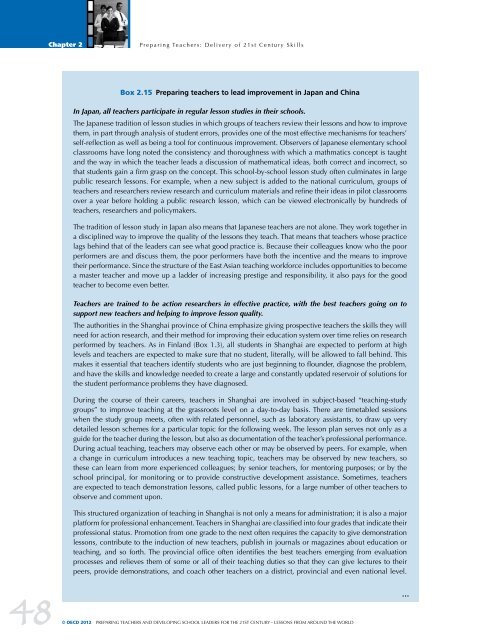Preparing Teachers and Developing School Leaders for the 21st Century
Preparing Teachers and Developing School Leaders for the 21st Century
Preparing Teachers and Developing School Leaders for the 21st Century
You also want an ePaper? Increase the reach of your titles
YUMPU automatically turns print PDFs into web optimized ePapers that Google loves.
48 ©<br />
Chapter 2<br />
<strong>Preparing</strong> teachers: delivery of <strong>21st</strong> century skills<br />
Box 2.15 <strong>Preparing</strong> teachers to lead improvement in Japan <strong>and</strong> China<br />
In Japan, all teachers participate in regular lesson studies in <strong>the</strong>ir schools.<br />
<strong>the</strong> Japanese tradition of lesson studies in which groups of teachers review <strong>the</strong>ir lessons <strong>and</strong> how to improve<br />
<strong>the</strong>m, in part through analysis of student errors, provides one of <strong>the</strong> most effective mechanisms <strong>for</strong> teachers’<br />
self-reflection as well as being a tool <strong>for</strong> continuous improvement. observers of Japanese elementary school<br />
classrooms have long noted <strong>the</strong> consistency <strong>and</strong> thoroughness with which a mathmatics concept is taught<br />
<strong>and</strong> <strong>the</strong> way in which <strong>the</strong> teacher leads a discussion of ma<strong>the</strong>matical ideas, both correct <strong>and</strong> incorrect, so<br />
that students gain a firm grasp on <strong>the</strong> concept. this school-by-school lesson study often culminates in large<br />
public research lessons. <strong>for</strong> example, when a new subject is added to <strong>the</strong> national curriculum, groups of<br />
teachers <strong>and</strong> researchers review research <strong>and</strong> curriculum materials <strong>and</strong> refine <strong>the</strong>ir ideas in pilot classrooms<br />
over a year be<strong>for</strong>e holding a public research lesson, which can be viewed electronically by hundreds of<br />
teachers, researchers <strong>and</strong> policymakers.<br />
<strong>the</strong> tradition of lesson study in Japan also means that Japanese teachers are not alone. <strong>the</strong>y work toge<strong>the</strong>r in<br />
a disciplined way to improve <strong>the</strong> quality of <strong>the</strong> lessons <strong>the</strong>y teach. that means that teachers whose practice<br />
lags behind that of <strong>the</strong> leaders can see what good practice is. Because <strong>the</strong>ir colleagues know who <strong>the</strong> poor<br />
per<strong>for</strong>mers are <strong>and</strong> discuss <strong>the</strong>m, <strong>the</strong> poor per<strong>for</strong>mers have both <strong>the</strong> incentive <strong>and</strong> <strong>the</strong> means to improve<br />
<strong>the</strong>ir per<strong>for</strong>mance. since <strong>the</strong> structure of <strong>the</strong> east asian teaching work<strong>for</strong>ce includes opportunities to become<br />
a master teacher <strong>and</strong> move up a ladder of increasing prestige <strong>and</strong> responsibility, it also pays <strong>for</strong> <strong>the</strong> good<br />
teacher to become even better.<br />
<strong>Teachers</strong> are trained to be action researchers in effective practice, with <strong>the</strong> best teachers going on to<br />
support new teachers <strong>and</strong> helping to improve lesson quality.<br />
<strong>the</strong> authorities in <strong>the</strong> shanghai province of china emphasize giving prospective teachers <strong>the</strong> skills <strong>the</strong>y will<br />
need <strong>for</strong> action research, <strong>and</strong> <strong>the</strong>ir method <strong>for</strong> improving <strong>the</strong>ir education system over time relies on research<br />
per<strong>for</strong>med by teachers. as in finl<strong>and</strong> (Box 1.3), all students in shanghai are expected to per<strong>for</strong>m at high<br />
levels <strong>and</strong> teachers are expected to make sure that no student, literally, will be allowed to fall behind. this<br />
makes it essential that teachers identify students who are just beginning to flounder, diagnose <strong>the</strong> problem,<br />
<strong>and</strong> have <strong>the</strong> skills <strong>and</strong> knowledge needed to create a large <strong>and</strong> constantly updated reservoir of solutions <strong>for</strong><br />
<strong>the</strong> student per<strong>for</strong>mance problems <strong>the</strong>y have diagnosed.<br />
during <strong>the</strong> course of <strong>the</strong>ir careers, teachers in shanghai are involved in subject-based “teaching-study<br />
groups” to improve teaching at <strong>the</strong> grassroots level on a day-to-day basis. <strong>the</strong>re are timetabled sessions<br />
when <strong>the</strong> study group meets, often with related personnel, such as laboratory assistants, to draw up very<br />
detailed lesson schemes <strong>for</strong> a particular topic <strong>for</strong> <strong>the</strong> following week. <strong>the</strong> lesson plan serves not only as a<br />
guide <strong>for</strong> <strong>the</strong> teacher during <strong>the</strong> lesson, but also as documentation of <strong>the</strong> teacher’s professional per<strong>for</strong>mance.<br />
during actual teaching, teachers may observe each o<strong>the</strong>r or may be observed by peers. <strong>for</strong> example, when<br />
a change in curriculum introduces a new teaching topic, teachers may be observed by new teachers, so<br />
<strong>the</strong>se can learn from more experienced colleagues; by senior teachers, <strong>for</strong> mentoring purposes; or by <strong>the</strong><br />
school principal, <strong>for</strong> monitoring or to provide constructive development assistance. sometimes, teachers<br />
are expected to teach demonstration lessons, called public lessons, <strong>for</strong> a large number of o<strong>the</strong>r teachers to<br />
observe <strong>and</strong> comment upon.<br />
this structured organization of teaching in shanghai is not only a means <strong>for</strong> administration; it is also a major<br />
plat<strong>for</strong>m <strong>for</strong> professional enhancement. teachers in shanghai are classified into four grades that indicate <strong>the</strong>ir<br />
professional status. Promotion from one grade to <strong>the</strong> next often requires <strong>the</strong> capacity to give demonstration<br />
lessons, contribute to <strong>the</strong> induction of new teachers, publish in journals or magazines about education or<br />
teaching, <strong>and</strong> so <strong>for</strong>th. <strong>the</strong> provincial office often identifies <strong>the</strong> best teachers emerging from evaluation<br />
processes <strong>and</strong> relieves <strong>the</strong>m of some or all of <strong>the</strong>ir teaching duties so that <strong>the</strong>y can give lectures to <strong>the</strong>ir<br />
peers, provide demonstrations, <strong>and</strong> coach o<strong>the</strong>r teachers on a district, provincial <strong>and</strong> even national level.<br />
OECD 2012 PreParing teachers <strong>and</strong> develoPing school leaders <strong>for</strong> <strong>the</strong> <strong>21st</strong> century – lessons froM around <strong>the</strong> World<br />
…


